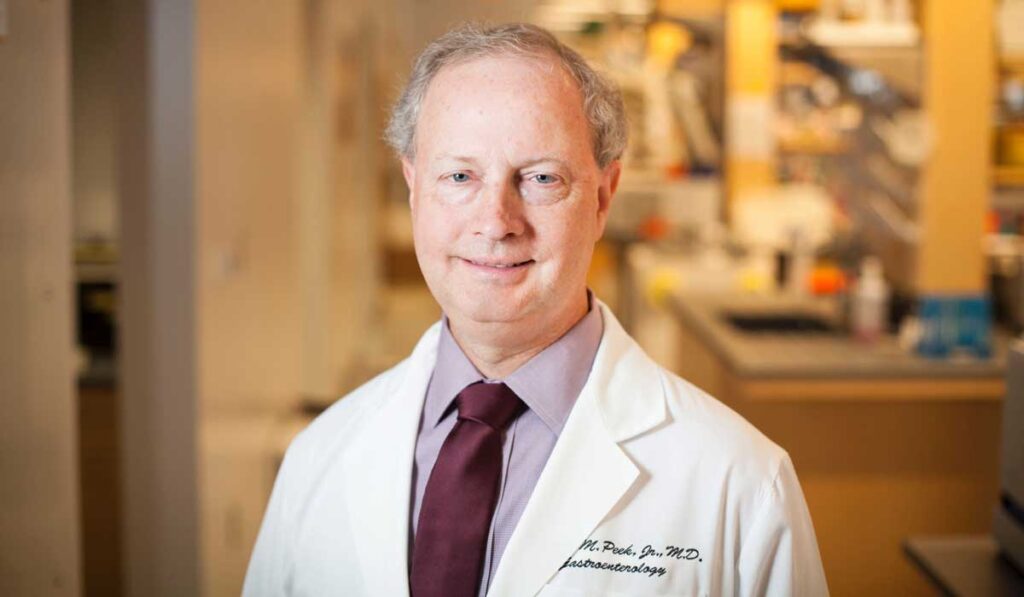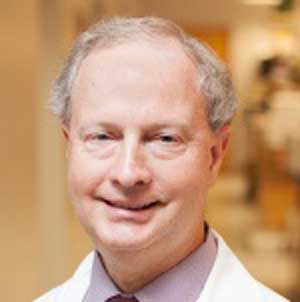Richard Peek, Jr., M.D., began his career at Vanderbilt University Medical Center during fellowship, and today serves as the director of the Division of Gastroenterology, Hematology and Nutrition. Discoveries recently spoke with Peek to learn more about breaking discoveries and recent advancements for prevention and treatment of some of the most challenging diagnoses in this specialty.
Discoveries: Dr. Peek, would you start by giving an overview of your research team’s current top areas of interest?
Peek: At Vanderbilt, we have a lot of experience with inflammation-induced malignancies, broadly – whether associated with inflammatory bowel disease (IBD) or other triggers. The overarching theme for our research has been delineation of the molecular signaling events initiated by contact between bacterial and epithelial cells that regulate phenotypes related to carcinogenesis. Our work, in conjunction with our collaborators, spans epidemiology, basic science and translational models and interventional studies.
A Global Focus
Discoveries: Much of your division’s research focuses on pathologies that impact populations in developing countries as much or more than the U.S. and other developed nations. Can you tell me about the significance of some of this work?
About half the globe is infected with Helicobacter pylori and this bacteria confers an attributable risk of about 90 percent for gastric cancer. Although only 1-3 percent of infected persons develop gastric cancer, the high burden of infection makes gastric cancer one of the most common cancers – and one of the top killers worldwide.
Due to the highly collaborative environment at Vanderbilt, we hold the only two NIH funded Program Project grants on H. pylori and gastric cancer in the country. These are focused on learning how gastric cancer stems from H. pylori infection as well as identifying biomarkers and targets for drug therapy. Further, researchers Jim Goldenring and Eunyoung Choi were awarded a Cancer Research UK grant to study the role of stromal cells in gastric cancer.
Targeting Carcinogenic Pathways
Discoveries: What is the key research on H. pylori to date that could ultimately reduce gastric cancer incidence?
Peek: Adherence of H. pylori to gastric epithelial cells is critical for induction of inflammation and injury. To develop or identify druggable targets for this disease, we first needed to define the mechanisms that regulate the biological interactions of H. pylori with its host that promote neoplastic transformation.
We initially focused on CagA, a strain-specific oncogenic protein produced by H. pylori, and demonstrated that CagA-positive strains augmented the risk for severe gastritis, intestinal metaplasia and gastric cancer. Our groups have collectively shown that CagA can activate carcinogenic pathways within host cells, such as those driven by β-catenin. Our collaborator, Dr. Keith Wilson, is testing means of interrupting and reversing metaplasia through clinical trials using the drug difluoromethylornithine (DFMO), which affects the ability of CagA to enter host cells. Importantly, Dr. Wilson’s group has also found that DFMO can prevent H. pylori-induced gastric cancer in animals.
Dietary Discoveries
Discoveries: Are there any new discoveries regarding the influence of diet on H. pylori infection and gastric cancer?
Peek: Through one Program Project grant, Drs. Tim Cover, Keith Wilson and I are focused on basic and translational aspects of how environmental dietary influences, like iron deficiency, affect gastric carcinogenesis.
This stems from findings that gastric cancer is twice as frequent in animals that are iron deficient when infected with H. pylori compared to animals that are iron replete. When we searched for the reason, we found that when H. pylori is exposed to iron deficient conditions, the bacteria more rapidly assemble a needle-like apparatus that injects CagA into the host cell, allowing H. pylori to acquire iron from its host for its own survival. In doing so, it also disrupts pathologic signaling, hence allowing CagA to function as an oncoprotein.
Our groups are also probing the known association between high dietary salt concentrations and an increased risk for gastric cancer. Tim Cover’s lab has found out that CagA is overexpressed when H. pylori are exposed to high salt concentrations, increasing its virulence. He’s also identified other virulence genes within the bacteria that seem to respond to salt.
The clinical implications of these dietary discoveries are, of course, to try to alter the diet in certain populations to reduce the risk of cancer, and to use these as potential biomarkers for screening persons at increased risk for the disease.
Changes to H. pylori Detection and Treatment
Discoveries: What are the current diagnostic criteria and treatment regimen for someone at high risk for gastric cancer, and how might these discoveries change this approach?
Peek: We have blood tests to ascertain iron levels and the presence of H. pylori as well. Our vision is to have these tests packaged together with other biomarkers and used to identify infected persons at high risk for developing gastric cancer. Developing regions in South America and East Asia are among those that would benefit most, since their rates of H. pylori infection and gastric cancer are considerably higher than ours in the U.S., though we are now seeing higher rates in certain U.S. subpopulations due to increased immigration.
“Looking ahead, we expect the findings from studies such as those funded by the Helmsley grant to uncover pathways that people have not even thought of yet.”
One of the big treatment challenges we face is that an effective anti-H. pylori regimen comprises three or four antibiotics. Further, there’s been increasing resistance rates across the world to the antibiotics that we normally rely on. To complicate things further, H. pylori strains have been shown to be reciprocally related to esophageal disease and atopic disease; thus, a more strategic and targeted approach is needed.
Making New Connections
Discoveries: We know that patients with IBD are at higher risk for inflammation-driven colorectal cancer. Is there a connection between gastric cancer research and IBD-associated cancers?
Peek: In addition to the association between inflammation and malignancy, we think that there are many commonalities between colitis-associated cancer and H. pylori-induced gastric cancer, though the pathways are not exactly the same. We have been very fortunate at Vanderbilt to garner funding to begin to precisely define these pathways among IBD patients.
Keith Wilson was awarded a $3 million Helmsley Foundation grant to study this on a very detailed molecular level. He is working with Drs. Ken Lau and Lori Coburn, using single-cell analysis techniques to identify all the expression changes that are aberrantly activated or suppressed in intestinal epithelial cells in patients with IBD. That is going to produce a beautiful molecular profile or roadmap for treatment targets.
“We truly sense that we are riding an upward trajectory toward improved prospects for patients with gastric cancer and IBD, here in the U.S. and globally.”
Once these molecular pathways are identified, the next step is to move those discovery-driven results into animal models using knockout mice that lack one or more of the pathways that are being activated. Therefore, this grant is going to spawn many mechanistic studies down the road.
Advances Ahead for IBD
Discoveries: Continuing on the topic of IBD, the new biologics have revolutionized treatment for many patients. What advances do you see ahead in improving their effectiveness further?
Peek: One question that is still being explored is which drugs work best to quell flares, maintain remission and minimize side effects. Our IBD Clinic, led by Dr. David Schwartz, is working on how to best help patients refractory to drug treatment. Vanderbilt has multiple trials looking at new inhibitors for targets such as IL-23 and other cytokine pathways and seeking to identify existing drugs that can be repurposed. Looking ahead, we expect the findings from studies such as those funded by the Helmsley grant to uncover pathways that people have not even thought of yet, because cell transcripts are being identified at a single-cell level.
At the same time, we are encouraged by outcomes when we combine biologics that target different points in the inflammatory response.
Holistic Care for IBD
Discoveries: How would you characterize the difference in an IBD patient’s diagnostic and treatment journey today versus a decade ago?
Peek: At Vanderbilt, the evolution to a comprehensive approach has been rapid, and is continuous. With IBD patients, you can’t just view it as a condition restricted to the GI tract. There may also be skin lesions, arthritis and bone disease, all related to the intestinal inflammation.
Our IBD Clinic has dedicated nurses, pharmacists, dieticians and psychologists to manage care of the entire patient. Dr. Sarah Horst is a gastroenterologist who has become a certified health coach, and Dr. Dawn Beaulieu, another gastroenterologist, is certified in functional medicine, which is a separate service offered within the clinic. It is truly, and appropriately, holistic care.
We are also growing in our ability to preempt the development and progression of IBD complications. Dr. Schwartz has very effectively used endoscopic ultrasound to diagnose and treat patients that have a particularly troubling complication, termed fistulas. Dr. Baldeep Pabla is using point-of-care ultrasound to identify abscesses and other complications in the office, so patients can initiate treatment more quickly.
Fostering a Productive Research Program
Discoveries: What would you say keeps your research team successful in pursuing studies of global significance?
Peek: Outside of the intrinsically curious and driven nature of the researchers in our program, one big factor is that I think we are all uniquely well supported with resources across Vanderbilt. This speaks to the vision that top leadership has held for many years. One example is the Vanderbilt transgenic mouse core, where we can order a knockout mouse that matches a genetic profile of interest. Another is a new IBD tissue repository, giving us a ready means of validating animal model findings in human tissue.
With these resources, the transformative nature of many of our findings, and our grant funding, the atmosphere here is one of optimism. We truly sense that we are riding an upward trajectory toward improved prospects for patients with gastric cancer and IBD, here in the U.S. and globally.





